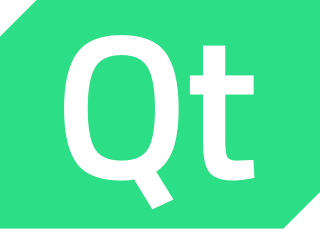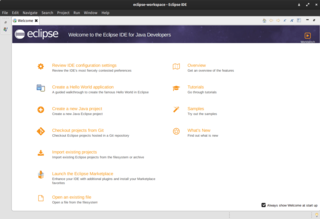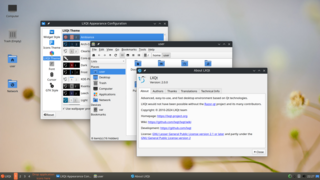
In computing, a plug-in is a software component that adds a specific feature to an existing computer program. When a program supports plug-ins, it enables customization.

Qt is cross-platform application development framework for creating graphical user interfaces as well as cross-platform applications that run on various software and hardware platforms such as Linux, Windows, macOS, Android or embedded systems with little or no change in the underlying codebase while still being a native application with native capabilities and speed.

KHTML is a discontinued browser engine that was developed by the KDE project. It originated as the engine of the Konqueror browser in the late 1990s, but active development ceased in 2016. It was officially discontinued in 2023.

Eclipse is an integrated development environment (IDE) used in computer programming. It contains a base workspace and an extensible plug-in system for customizing the environment. It is the second-most-popular IDE for Java development, and, until 2016, was the most popular. Eclipse is written mostly in Java and its primary use is for developing Java applications, but it may also be used to develop applications in other programming languages via plug-ins, including Ada, ABAP, C, C++, C#, Clojure, COBOL, D, Erlang, Fortran, Groovy, Haskell, JavaScript, Julia, Lasso, Lua, NATURAL, Perl, PHP, Prolog, Python, R, Ruby, Rust, Scala, and Scheme. It can also be used to develop documents with LaTeX and packages for the software Mathematica. Development environments include the Eclipse Java development tools (JDT) for Java and Scala, Eclipse CDT for C/C++, and Eclipse PDT for PHP, among others.
A source-code-hosting facility is a file archive and web hosting facility for source code of software, documentation, web pages, and other works, accessible either publicly or privately. They are often used by open-source software projects and other multi-developer projects to maintain revision and version history, or version control. Many repositories provide a bug tracking system, and offer release management, mailing lists, and wiki-based project documentation. Software authors generally retain their copyright when software is posted to a code hosting facilities.

Mercurial is a distributed revision control tool for software developers. It is supported on Microsoft Windows, Linux, and other Unix-like systems, such as FreeBSD and macOS.

Audacious is a free and open-source audio player software with a focus on low resource use, high audio quality, and support for a wide range of audio formats. It is designed primarily for use on POSIX-compatible Unix-like operating systems, with limited support for Microsoft Windows. Audacious was the default audio player in Ubuntu Studio in 2011–12, and was the default music player in Lubuntu until October 2018, when it was replaced with VLC.

LXDE is a free desktop environment with comparatively low resource requirements. This makes it especially suitable for use on older or resource-constrained personal computers such as netbooks or system on a chip computers.

Kdenlive is a free and open-source video editing software based on the MLT Framework, KDE and Qt. The project was started by Jason Wood in 2002, and is now maintained by a small team of developers.
In FOSS development communities, a forge is a web-based collaborative software platform for both developing and sharing computer applications.

Lubuntu is a lightweight Linux distribution based on Ubuntu that uses the LXQt desktop environment in place of GNOME. Lubuntu was originally touted as being "lighter, less resource hungry and more energy-efficient", but now aims to be "a functional yet modular distribution focused on getting out of the way and letting users use their computer".

KTechLab is an IDE for electronic and PIC microcontroller circuit design and simulation; it is a circuit designer with auto-routing and a simulator of common electronic components and logic elements.

KWrite is a lightweight text editor developed by the KDE free software community. Since K Desktop Environment 3, Kwrite has been based on the Kate text editor and the KParts framework, allowing it to use many of Kate's features.

LightDM is a free and open-source X display manager that aims to be lightweight, fast, extensible and multi-desktop. It can use various front-ends to draw the user interface, also called Greeters. It also supports Wayland.

KDE Frameworks is a collection of libraries and software frameworks readily available to any Qt-based software stacks or applications on multiple operating systems. Featuring frequently needed functionality solutions like hardware integration, file format support, additional graphical control elements, plotting functions, and spell checking, the collection serves as the technological foundation for KDE Plasma and KDE Gear. It is distributed under the GNU Lesser General Public License (LGPL).
A bug bounty program is a deal offered by many websites, organizations, and software developers by which individuals can receive recognition and compensation for reporting bugs, especially those pertaining to security exploits and vulnerabilities.

LXQt is a free and open source lightweight desktop environment. It was formed from the merger of the LXDE and Razor-qt projects.

Matrix is an open standard and communication protocol for real-time communication. It aims to make real-time communication work seamlessly between different service providers, in the way that standard Simple Mail Transfer Protocol email currently does for store-and-forward email service, by allowing users with accounts at one communications service provider to communicate with users of a different service provider via online chat, voice over IP, and videotelephony. It therefore serves a similar purpose to protocols like XMPP, but is not based on any existing communication protocol.
JPEG XL is a royalty-free raster-graphics file format that supports both lossy and lossless compression. It is designed to outperform existing raster formats and thus become their universal replacement.



















